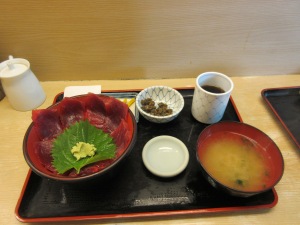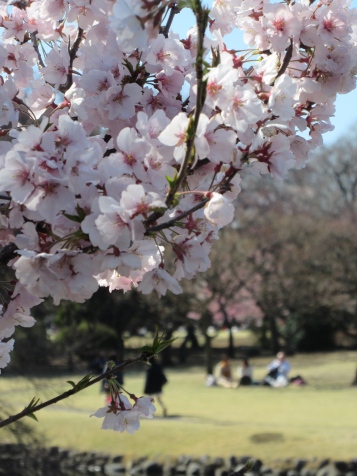I’m going to make a full post later with ALL my advice, but I wanted to give this its own post while I’m thinking about it.
Before I came to Japan on the Japan Study program, I got a big packet of information, which included some quotes from previous students. I remember reading a warning from a student that the dress code in Japan is pretty formal compared to America. The student warned against bringing jeans, and suggested skirts, slacks (??) and dresses were better choices to bring for girls. Due to this and some other stuff I had heard, I spent a considerable amount of money before coming to Japan on nicer clothes, and even more money in Japan on buying clothes here. I spent a lot of mental energy worrying about what I was wearing and how it compared to the people around me.
 Above: Me at Earlham before going to Japan. Hanging out in the dorm in a t-shirt and sweats (often went to class like this too).
Above: Me at Earlham before going to Japan. Hanging out in the dorm in a t-shirt and sweats (often went to class like this too).
Right: Me in Japan during orientation (right). Wearing a dress on a day out, trying real hard!!
I can say without a doubt that I developed a kind of identity crisis due to the sudden increase of awareness of my appearance and comparing myself to others. I have written about this a bit in previous posts. This was by far the biggest thing I struggled with in Japan. After a year of going through this I feel I have been mentally and emotionally worn down, and if possible I want to advise future students so they can avoid having the same problem I had.
If you look at pictures from my year in Japan, you might not be able to tell that I changed my appearance much. But the problem I’m talking about is a mental/emotional one that I believe originated from attempting to be somebody I’m not.
It is true that people dress nicer than the average American on a daily basis here.
But that does not mean that YOU have to change a single thing about how you look.
I like to wear jeans and t-shirts and tank tops. That’s my basic go-to look. Sometimes I’ll wear a dress for a nice occasion, but generally my version of “looking nice” is basically wearing a shirt that doesn’t have anything written on it. There are some people who like to express themselves by wearing very cute or stylish clothing. I express myself by NOT. I just am not a person who cares about appearances, and I believe I express that part of my personality by wearing clothing that takes minimal thought and effort.
When I came to Japan, I thought that my choice of appearance would not be accepted.
More than actually being judged by people, my own assumption that people would judge me made me want to change to conform to what I thought would be acceptable. So regardless of the way I really wanted to dress, I made choices that fit what I thought would be more acceptable in the eyes of the people here.
What I didn’t consider was the fact that my sense of self is so closely tied to the way I express myself to others, and that in changing my self expression I lost my grasp on my sense of self. I guess in some way I thought I wouldn’t be able to make friends if I dressed the way I normally do (because who would want to be friends with someone in JEANS AND A T-SHIRT!? god forbid…) Maybe I thought I would be making things easier on myself by fitting in more with the people here. But ultimately, I didn’t get satisfaction from changing the way I look. I just started to feel less and less like myself, in a completely new world where the things that make me me are just about the ONLY things that remained the same. While faced daily with a new language, new people, and new places, I started to lose the thing that was grounding me to myself.
I don’t think there was any one moment of enlightenment where I realized what I was doing to myself. I just gradually came to realize that it wasn’t such a big deal as I was making it out to me. More of it was what I perceived, not what was actually there. Here are some important things I realized, and things I want other people like me to know before they come to Japan:
☆ It’s college. Not a job interview, not a work place, not a fancy dinner party.
Yes, I am fully aware that there are situations in which my jeans and t-shirts are unacceptable. I would not consider dressing up for these situations some kind of identity lie. However, studying abroad is not one of these situations. It’s college. You can wear whatever the hell you want.
☆ Not everyone is dressed to the nines, despite first appearances.
It’s easy to take a quick look around and decide everyone around you is dressed 1000x more formally than you are. However, if you really look at people, you see how many different styles there are. There are plenty of people wearing sweats and t-shirts, sneakers, jeans, anything you could imagine. Because, (see point above) it’s college.
☆ You are a foreigner.
It’s usually not a good idea to use the “foreigner card,” especially when it comes to things like ignoring cultural manners and etiquette. However, your clothes are a reflection of not only yourself but also the culture you come from. Nobody is going to look at you like, wtf that girl is wearing jeans, they’re just going to take it in as your image and not going to care a whole lot about it.
☆ People care a lot less than you probably think.
Kind of reflected in all of the points above, but I guess the take-away here is that you are a college student and everyone has more important, and frankly more interesting things to think about than what you’re wearing. You are probably the person who cares about it the most, and what’s fun about that?
I wish I had known this before coming to Japan. I know it’s a lot easier said than done, to care less about what people think of you and stay true to yourself, and all that clichéd stuff. But it’s really, really important, especially in a place where you can feel so lost in every other way. My personal story aside, I want to encourage anyone coming to study abroad in Japan to relax. Don’t run out and buy a whole new wardrobe, and don’t leave all your favorite clothes behind.
You as an individual have wonderful things to contribute to the relationships you will make here and the memories you will create. Don’t let trying to be someone you’re not get in the way of that.
With Love, Abby








